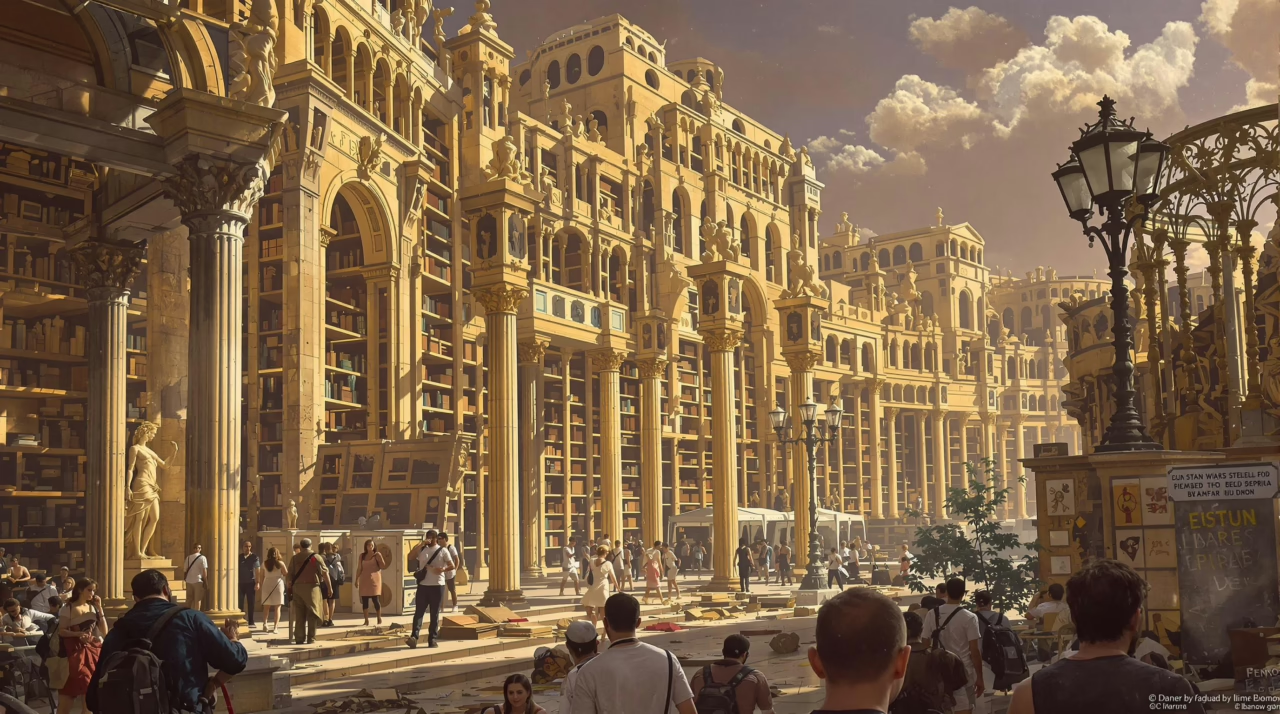The Lost Library of Alexandria

The loss of the Library of Alexandria in 48 BCE remains one of history’s greatest tragedies. It housed a wealth of knowledge, from philosophy to science, compiled over centuries.
Scholars ponder the invaluable works that vanished in the flames. What insights were lost forever?
How did this event shape the trajectory of human thought?
These questions linger, inviting exploration into the depths of what was once a beacon of intellect and culture.
TL;DR
Hide- The fire of 48 BCE, initiated by Julius Caesar's military actions, marked a significant loss of texts and knowledge within the Library.
- Scholars speculate that invaluable works on mathematics, science, and philosophy were among the texts lost in the fire.
- The exact extent of the destruction remains debated, with some arguing that many manuscripts may have survived or been relocated.
- Subsequent conflicts and political tensions further contributed to the library's decline and the potential loss of knowledge.
- The cultural legacy of the library continues to impact modern scholarship, emphasizing the importance of preserving intellectual heritage.
Alexandria’s Great Library: A Center of Knowledge in the Ancient World
The Library of Alexandria, established by the Ptolemies, was more than a mere collection of scrolls; it represented a groundbreaking approach to knowledge in the ancient world.
How did its unique structure and organization facilitate the pursuit of learning and scholarship?
What can this monumental institution teach us about the value placed on knowledge in a society aiming for intellectual greatness?
Founding by the Ptolemies
The founding of the Library of Alexandria by the Ptolemies marks a pivotal moment in the history of knowledge.
What inspired Ptolemy I and his successors to create such an unparalleled center of learning, and how did they transform Alexandria into a beacon of intellectual pursuit?
Exploring these questions reveals the profound vision and enduring influence that shaped this ancient hub of scholarship.
Vision and Influence of Ptolemy I and Successors
While many ancient civilizations sought to preserve knowledge, the vision of Ptolemy I and his successors uniquely transformed Alexandria into a beacon of intellectual pursuit.
Their commitment to collecting texts and fostering scholarly dialogue not only enriched the cultural landscape but also inspired future generations.
Could this pursuit of knowledge have ignited a passion for learning that transcended borders and time?
Why Alexandria Became a Hub of Learning

Alexandria’s emergence as a center of knowledge was not merely a product of its geographical advantages or the wealth acquired by the Ptolemies; it was a deliberate and visionary endeavor to cultivate a lively intellectual community.
Structure and Organization of the Library
The remarkable structure and organization of the Library of Alexandria invite questions about its role as a beacon of knowledge in the ancient world.
How were the various facilities designed to accommodate the vast collection of scrolls, and what methods were employed by scribes to acquire and catalog this wealth of information?
Understanding these aspects may shed light on how the library functioned as a center for scholarly pursuit and intellectual exchange.
Layout, Facilities, and Scribes
Amidst the bustling intellectual fervor of ancient Alexandria, the Library stood as a monumental tribute to human curiosity and scholarly pursuit.
Its grand layout, adorned with lecture halls and reading rooms, fostered collaboration. Highly skilled scribes meticulously transcribed knowledge, ensuring the preservation of wisdom.
What insights might have emerged from this crucible of thought, had time not extinguished such brilliance?
The library’s legacy remains tantalizingly elusive.
How Scrolls Were Acquired and Catalogued
In a world where knowledge was both a prized possession and a powerful tool, the Library of Alexandria employed a meticulous system for acquiring and cataloguing its scrolls.
Scholars scoured the known world, collecting works from diverse cultures.
Each scroll underwent careful examination and classification, ensuring that the library not only preserved wisdom but also fostered an environment where ideas could flourish and challenge the status quo.
The Library’s Unrivaled Collection
The Library of Alexandria was renowned for its vast and diverse collection of texts, representing a confluence of knowledge from across the ancient world.
What might the magnitude of these writings reveal about the intellectual pursuits and global connections of scholars during that era?
As one contemplates the library’s unparalleled resources, questions emerge regarding the impact of such a repository on the advancement of human thought.
Magnitude and Diversity of Texts
The Library of Alexandria stood as a beacon of knowledge, housing an astonishing array of texts that spanned a multitude of disciplines.
How did the works on mathematics, astronomy, and medicine intertwine with the rich tapestries of philosophy, literature, and history?
This unparalleled collection invites exploration into the intellectual legacy that shaped ancient thought and continues to influence modern scholarship.
Mathematics, Astronomy, and Medicine
While many ancient libraries housed valuable texts, none matched the sheer magnitude and diversity found within the Library of Alexandria, particularly in the domains of mathematics, astronomy, and medicine.
This unprecedented collection not only advanced human knowledge but raised profound questions about the universe and health.
What groundbreaking ideas and discoveries were lost forever in the flames, leaving humanity to ponder their unattained potential?
Philosophy, Literature, and History
With a foundation in the rigorous disciplines of mathematics, astronomy, and medicine, the Library of Alexandria also stood as a beacon of philosophical thought, literary achievement, and historical scholarship.
Its vast collection encompassed diverse texts, fostering dialogue and inquiry.
What ideas were lost in the flames? Could the wisdom of ancient thinkers reshape modern thought, igniting a quest for understanding that transcends time?
Global Reach of Scholars
The Library of Alexandria served as a beacon for scholars from various corners of the ancient world, drawing translators and interpreters enthusiastic to share knowledge.
How did these intellectual exchanges shape understanding across cultural boundaries?
The collaborative spirit fostered within its walls not only enriched the library’s collection but also laid the groundwork for a more interconnected scholarly community.
Translators and Interpreters from Distant Lands
Scholarly collaboration often transcends geographical boundaries, as exemplified by the diverse array of translators and interpreters who contributed to the Library of Alexandria‘s unparalleled collection.
These individuals, hailing from distant lands, not only bridged language gaps but also enriched the library’s repository with varied perspectives.
What insights were lost alongside their translations when the flames of 48 BCE consumed this treasure trove of knowledge?
Collaboration that Crossed Cultural Boundaries
Although often perceived as a product of ancient Greek thought, the Library of Alexandria was, in fact, a lively melting pot of ideas and knowledge from around the world.
Scholars from diverse cultures collaborated, exchanging philosophies, scientific discoveries, and literary works. This dynamic interplay fostered innovation and intellectual growth, prompting one to ponder: what groundbreaking insights were lost alongside the flames that consumed this remarkable sanctuary of learning?
Prominent Thinkers of Alexandria
The intellectual landscape of Alexandria was shaped by remarkable figures such as Archimedes and Euclid, whose groundbreaking contributions laid the foundations for mathematics and science.
Meanwhile, Hypatia emerged as a beacon of knowledge and teaching, inspiring generations with her wisdom.
What lasting impacts did these thinkers have on both their contemporaries and the course of intellectual history?
Archimedes, Euclid, and Their Contributions
What insights might the geometric principles of Euclid and the mechanical innovations of Archimedes reveal about the intellectual climate of ancient Alexandria?
Their groundbreaking work not only shaped mathematics and physics but also laid the groundwork for future scientific advancements.
How have their contributions continued to influence modern thought and technology?
Geometric Principles and Mechanical Inventions
As scholars ponder the remarkable advancements of ancient Alexandria, the contributions of Euclid and Archimedes emerge as pivotal in the domains of geometry and mechanics.
Their legacies provoke curiosity about:
- The foundations of Euclidean geometry
- Archimedes’ principles of buoyancy
- The invention of the Archimedean screw
- Geometric proofs that shaped mathematics
- The implications of their work on future innovations
What secrets might these thinkers still hold?
Influence on Future Scientific Milestones
Though the ancient world often seems distant, the intellectual legacy of Alexandria’s prominent thinkers, such as Archimedes and Euclid, continues to resonate profoundly in modern scientific discourse.
Their groundbreaking theories and mathematical principles laid the foundation for future advancements in physics and geometry.
How might contemporary science further unravel the complexities of their insights, revealing new domains of understanding and innovation?
Hypatia and the Legacy of Teaching
Hypatia stands as a remarkable figure in the annals of Alexandria, not only for her intellectual prowess but also for her groundbreaking role as a woman in a primarily male-dominated field.
How did her teachings navigate the complex political landscape of her time, and what impact did they have on the evolution of scholarship?
Exploring these questions reveals the intricate interplay between her contributions and the societal tensions that ultimately shaped her legacy.
Pioneering Role of Women in Scholarship
Throughout history, the contributions of women to scholarship have often been overshadowed, yet the figure of Hypatia of Alexandria emerges as a beacon of intellectual prowess and resilience.
Her influence can be seen in various aspects of scholarship:
- Advocacy for mathematical rigor
- Promotion of philosophical inquiry
- Encouragement of scientific exploration
- Mentorship of students
- Challenge to societal norms
What legacy did she truly leave behind?
Political Tensions Surrounding Her Work
The intellectual climate of Alexandria during Hypatia’s time was rife with political strife, which profoundly influenced her work and legacy.
As tensions escalated between competing factions, Hypatia’s role as a philosopher became increasingly precarious.
How did her commitment to knowledge challenge authoritarianism?
In a world fraught with discord, her teachings illuminated paths to understanding, yet also ignited animosity that would ultimately seal her tragic fate.
The Fire of 48 BCE: Caesar’s Involvement
The fire of 48 BCE marked a pivotal moment in the history of the Library of Alexandria, raising questions about the circumstances that led to its devastating blaze.
How did Julius Caesar’s military actions contribute to the extent of the destruction, and what was lost in the flames?
Understanding these events invites a deeper reflection on the fragile nature of knowledge and the consequences of conflict.
Events Leading to the Blaze
The events surrounding the fire of 48 BCE raise intriguing questions about the intersection of warfare and cultural preservation.
Julius Caesar’s military actions within Alexandria inadvertently set the stage for a calamity that would engulf one of history’s most revered repositories of knowledge.
What complexities and miscalculations contributed to this tragic conflagration, forever altering the fate of the Library?
Julius Caesar’s Military Maneuvers in the City
Amidst the tumult of civil war, Julius Caesar’s maneuvers within Alexandria unfolded with both strategic brilliance and unforeseen consequences.
His actions raised questions about the cost of ambition, including:
- The strategic advantage of controlling the city
- The potential loss of cultural heritage
- The chaos released among the populace
- The role of alliances in warfare
- The legacy of military decisions in history
What truths were lost in the flames?
Complications That Sparked the Catastrophe
As tensions escalated in Alexandria during the summer of 48 BCE, a series of miscalculations and reckless decisions converged, ultimately igniting a catastrophic fire that would consume not only structures but also fragments of history.
Caesar’s military strategy, coupled with local unrest, created a volatile atmosphere.
Could the ambition of one man truly eclipse the intellectual treasures of a civilization?
The stakes were alarmingly high.
The Extent of the Damage
The historical accounts surrounding the fire of 48 BCE present a perplexing puzzle regarding the extent of the damage inflicted on the Library of Alexandria.
With conflicting narratives emerging from ancient sources, how much knowledge was irretrievably lost remains a subject of heated debate.
As scholars sift through these accounts, one must wonder: what was the true cost of this catastrophic event on the intellectual heritage of humanity?
Conflicting Historical Accounts
While the ancient world is rife with tales of destruction and loss, the fire of 48 BCE in Alexandria stands out for its contentious historical interpretations, particularly regarding Julius Caesar’s role in the calamity.
Scholars debate:
- Caesar’s intentions
- The fire’s accidental nature
- The extent of damage to the library
- Eyewitness accounts
- The political ramifications
Such conflicting narratives continue to intrigue historians and enthusiasts alike.
Debate Over How Much Was Actually Destroyed

Although the flames of 48 BCE are often attributed to Caesar’s military actions, the true extent of the destruction remains a subject of fervent debate among historians.
Was it merely a portion of the library, or did invaluable works perish in the chaos?
This uncertainty stirs curiosity about the lost knowledge and the potential impact on humanity’s intellectual heritage.
How much wisdom vanished in that fateful fire?
Alternative Theories and Later Destructions
The fate of the Library of Alexandria remains shrouded in mystery, prompting speculation about subsequent fires during different reigns that could have further eroded its vast collection.
Could it be that the library’s destruction was a gradual process rather than a singular catastrophic event? This raises the poignant question: did all knowledge truly vanish, or might fragments of it have survived in unexpected places?
Additional Fires Under Different Rulers
The fate of the Library of Alexandria may not have been sealed by a single catastrophic event, but rather through a series of fires and conflicts under various rulers.
Aurelian’s campaign, for instance, raises questions about the extent of damage inflicted during his conquests, while the impact of religious tensions adds another layer of complexity to the library’s decline.
What alternative theories exist regarding these later destructions, and how do they reshape our understanding of this ancient center of knowledge?
Aurelian’s Campaign and Possible Further Losses
While Aurelian’s campaign against Palmyra is often associated with military triumph, it also raises questions about the collateral damage inflicted upon the cultural legacy of Alexandria.
Scholars speculate on the extent of losses, including:
- Destruction of texts during sieges
- Displacement of scholars
- Loss of knowledge through neglect
- Fires ignited by conflict
- Potential censorship of ideas
What truths were lost amidst this chaos?
Religious Conflicts and Library’s Fate
Amidst the turmoil of religious conflicts in ancient Alexandria, questions arise regarding the library’s ultimate fate and the various theories surrounding its destruction.
Some suggest that fervent clashes between pagans and early Christians led to further losses, while others speculate about deliberate acts by later rulers seeking to erase knowledge.
Each theory invites reflection on the fragility of knowledge amid human discord and ambition.
Did All Knowledge Vanish?
The fate of the knowledge housed in the Library of Alexandria raises intriguing questions about the preservation of wisdom through time.
Could it be that some manuscripts were not entirely lost but rather relocated to other centers of learning, influencing future libraries and archives?
As history unfolds, the possibility of surviving texts prompts a reevaluation of what truly constitutes the disappearance of knowledge.
Surviving Manuscripts Moved Elsewhere
Though the fate of the Library of Alexandria often evokes images of a singular catastrophic event, alternative theories suggest that some manuscripts may have survived the turmoil and were relocated to other centers of knowledge.
Could other libraries have preserved fragments of this wisdom? Consider the possibilities:
- Athens
- Constantinople
- Pergamum
- Antioch
- Rome
Might these places hold secrets lost to time?
Influence on Future Libraries and Archives
While many assume that the loss of the Library of Alexandria marked an irrevocable end to ancient knowledge, the reality may be more complex.
Subsequent libraries and archives drew inspiration from its legacy, aiming to preserve knowledge against future catastrophes.
Yet, history reveals a pattern of destruction, prompting a critical question: did the essence of that knowledge truly vanish, or merely transform?
Modern Perspectives and Ongoing Searches
In the quest to understand the Lost Library of Alexandria, modern archaeological efforts continue to unearth not only artifacts but also the cultural legacy that shaped ancient knowledge.
What drives the global fascination with this iconic institution, and how do contemporary searches reflect humanity’s enduring desire to reclaim lost wisdom?
As researchers probe the depths of Alexandria, the question remains: can the echoes of the past guide the future of intellectual exploration?
Archaeological Efforts in Alexandria
Beneath the waters of Alexandria’s harbor lies a treasure trove of sunken ruins, remnants of a once-great civilization.
Could these submerged structures hold the key to uncovering traces of the legendary Library of Alexandria?
As modern archaeology advances, the quest to reveal these secrets raises questions about what knowledge might still be waiting to resurface.
Sunken Ruins Beneath the Harbor
Countless stories swirl around the submerged remains of the ancient Library of Alexandria, igniting curiosity among scholars and treasure hunters alike.
Ongoing archaeological efforts have revealed:
- Mysterious stone blocks
- Ancient artifacts
- Remnants of monumental architecture
- Possible inscriptions
- Clues to lost knowledge
These findings continue to inspire exploration, as the depths of Alexandria’s harbor hold secrets waiting to be uncovered.
Hopes of Uncovering Traces of the Library
As researchers explore deeper into the submerged remnants of the ancient Library of Alexandria, they remain fueled by a relentless pursuit of knowledge that has eluded humanity for centuries.
Each artifact unearthed sparks questions about lost texts and forgotten philosophies.
Can remnants of wisdom still reside beneath the waves, waiting to illuminate paths toward understanding and freedom?
The quest continues, inviting minds to dream of rediscovered enlightenment.
Cultural Legacy and Global Fascination
The enduring allure of the Lost Library of Alexandria raises intriguing questions about its impact on contemporary scholarship and cultural identity.
What lessons can modern scholars draw from this ancient repository of knowledge, and why does its mystery continue to capture the global imagination?
As ongoing searches seek to uncover remnants of its legacy, the fascination with what was lost prompts reflection on the value of knowledge in today’s world.
Why the Lost Library Still Captivates Minds
What is it about the Lost Library of Alexandria that continues to ignite the imagination of scholars, historians, and the public alike?
Its allure persists due to several factors:
- The mystery surrounding its vast collection
- The potential knowledge lost to history
- Its symbol of intellectual pursuit
- The quest for ancient wisdom
- The ongoing exploration of historical truths
These elements foster a cultural legacy that captivates minds.
Lessons for Present-Day Scholars
While the mysteries of the Lost Library of Alexandria may never be fully unraveled, the quest for understanding its legacy offers invaluable lessons for present-day scholars.
It encourages the pursuit of knowledge amidst uncertainty, fosters interdisciplinary collaboration, and highlights the importance of preserving cultural heritage.
As scholars navigate modern complexities, the library’s story serves as a beacon for inquiry, resilience, and intellectual freedom.
Wrapping Up
The tragic fate of the Library of Alexandria serves as a poignant reminder of the delicate threads that weave together human knowledge.
As the flames consumed ancient scrolls, they not only razed physical texts but also extinguished the light of countless ideas and discoveries.
What insights slipped through the cracks of time, lost to the annals of history?
The quest to uncover these secrets continues, urging us to reflect on our own stewardship of knowledge in a world still rife with conflict.



